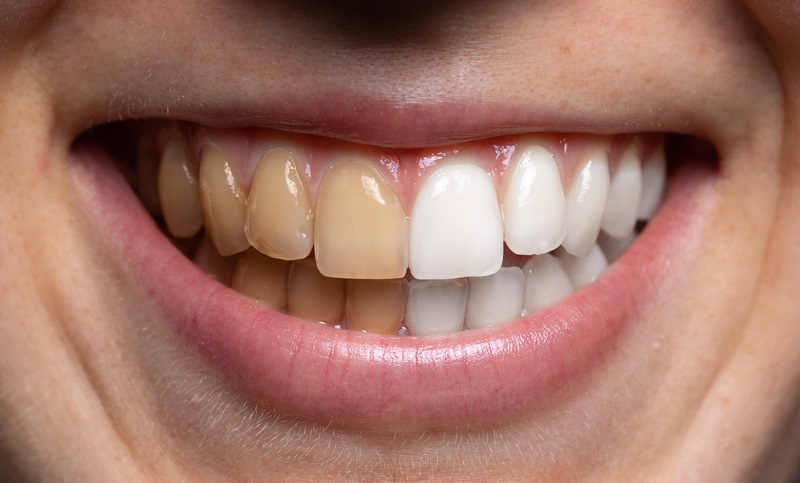Stains on Teeth: Causes, Treatment and Prevention
Contents

What Causes Teeth Stains?
Teeth discolouration can occur due to a variety of factors. Some are uncontrollable, such as age or childhood mishaps, which might impair the formation of our tooth enamel.
That is why it is vital to consult with your dentist about any plans for teeth whitening. He or she can tell you whether your tooth darkening is due to lifestyle variables such as frequent coffee drinking, or whether it represents a dental health risk.
Although whitening is usually done for cosmetic reasons, your dentist may be able to advise you on the best treatment options based on the type of staining you have.
The good news is that we can often reverse dental discolouration. This makes pursuing a white, healthy smile appealing.
Tooth Stains Induced by Bad Habits:
1. Dietary Choices
Drinks like coffee, tea, cola, and wine, as well as starchy foods like pasta and potatoes, can contribute to tooth staining.
2. Tobacco Use
Both smoking and chewing tobacco can discolor teeth, leaving stains that are tough to remove.
3. Poor Dental Hygiene
Skipping regular brushing and flossing allows plaque and food particles to build up, leading to staining. Neglecting professional dental cleanings also increases the likelihood of discoloration.
4. Medical Conditions
Certain diseases can affect the development of tooth enamel and dentin, leading to discolored teeth. Treatments like radiation therapy and chemotherapy may also cause discoloration. In pregnant women, some conditions can interfere with the baby's enamel formation, potentially causing stains.
5. Medications
Some medicines, especially in children, can affect tooth color. Tetracycline and doxycycline are known to disrupt enamel development in kids under eight. Mouth rinses with chlorhexidine or cetylpyridinium chloride, as well as antihistamines, antipsychotics, and blood pressure medications, can also lead to discoloration.
6. Dental Materials
Amalgam fillings, especially those with silver sulfide, can give teeth a greyish-black tint.
7. Aging
As we age, the enamel wears down, exposing the yellowish dentin beneath. Over time, the dentin thickens and the pulp shrinks, making teeth appear darker and less translucent.
8. Fluorosis
Excessive fluoride intake during tooth development—either from water with high fluoride levels or overuse of fluoride products—can cause a condition called fluorosis, which leads to staining.
9. Trauma
Injuries to the mouth, especially in children under eight, can impact enamel development. For adults, the trauma that reduces blood flow to the tooth or damages the nerve can also lead to discoloration.
Are Stained Teeth Unhealthy?
As the various causes of stained teeth demonstrate, there is no simple answer to this topic. Your dentist is the only one who can provide a solution.
Healthy teeth can get discoloured, whereas bad teeth might become white. There is just no way to generalize about your teeth's health based on their colour.
However, certain stains can suggest an underlying health issue that you should be concerned about.
Your teeth can reflect your general health, therefore you should pay particular attention to any stains that appear on them. However, only a dentist can tell you if your teeth are truly healthy.
How to Prevent Teeth Stains?
Preventing stains is easier than removing them. Whether you’re maintaining a bright smile or dealing with stains, here are some tips to help:
Limit Stain-Causing Drinks
Reduce your intake of coffee, red wine, cola, and tea. If you can’t skip your favourites, drink water and rinse your mouth afterwards to minimize staining until you can brush.Regular Dental Cleanings
Visit your dentist for professional dental cleanings every six months to prevent discoloration and keep your teeth looking fresh.Maintain Good Oral Hygiene
Brush twice a day, floss daily, and use mouthwash regularly. Whitening toothpaste or mouthwash can help keep stains from setting in.- Quit Smoking
Giving up tobacco not only improves your oral health but also benefits your overall well-being.
Final Thoughts
As your first line of defence, start with whitening toothpaste, strips, or other over-the-counter treatments. If these don’t deliver the desired results, your dentist may recommend professional teeth whitening.
For more severe discoloration, options like dental bonding, veneers, or crowns are available, though they are often more costly, which is why many begin with whitening.
However, it's essential to adjust your habits if you opt for dental restorations, as they cannot be whitened once applied. To preserve their appearance, avoid stain-causing foods and beverages, quit smoking, and prioritize good oral hygiene.
In today’s world, a bright, healthy smile is always in style. Just be mindful of how you care for it. Always consult with your dentist before using any DIY or over-the-counter whitening products to ensure you’re safely maintaining your smile for years to come.


